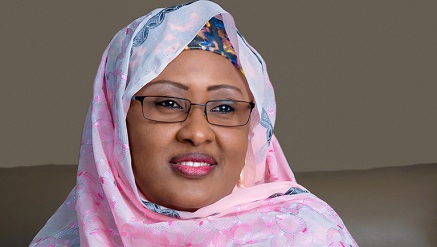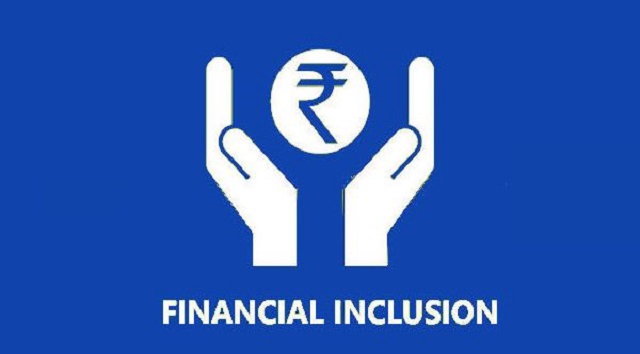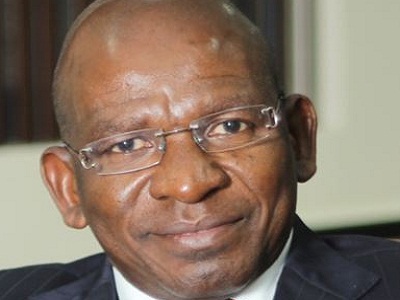News
Buhari’s Row with Wife Signals Frustration over FG Inertia

A row between the Nigerian President Muhammadu Buhari and his wife has brought cracks in the ruling party right into the open, as frustration grows over government inertia in trying to drag the country out of its first recession in 25 years.
Aisha Buhari publicly criticised her husband’s record in office, saying she might not support him if he seeks re-election in 2019 unless he shakes up his administration, which she said had been hijacked by a “few people”.
The president tried to laugh off the rebuke from his wife of 27 years, saying “she belongs in the kitchen” – but without addressing the substance of her remarks, made last week in an interview with the BBC.
Reuters reported that the 73-year-old won last year’s election promising a new era in the West African nation, where graft has enriched an elite while most of the 180 million Nigerians live in poverty despite the OPEC member’s oil wealth.
Buhari came to power backed by his All Progressives Congress (APC) party, a broad coalition of politicians who united to remove his predecessor, Goodluck Jonathan, without having a joint plan on how to run the country.
Now, 17 months into office, there are few signs of Buhari’s promised reforms to diversify the economy away from exporting crude, prices of which have halved since 2014.
Already the naira is down 35 percent this year, making it one of the worst performing currencies in the world, and the National Bureau of Statistics forecasts the economy will shrink by 1.3 percent in 2016.
But criticism of the government goes beyond an apparent lack of urgency in tackling the economic crisis. A belief is growing that power is concentrated among Buhari’s chief of staff and an inner circle at the presidential villa, making it difficult for ministers to get the attention of the president.
The first lady is not alone in her views. Senate President Bukola Saraki, the third most senior politician in Nigeria, took to Twitter to express his concerns.
“It has become clear that there is govt within govt of @MBuhari who’ve seized apparatus of Executive powers to pursue their nefarious agenda,” he tweeted in June.
Buhari’s spokesmen declined to comment while the president himself has defended his economic record in general terms.
“I believe that this recession will not last,” he said this month. “We have identified the country’s salient problems and we are working hard at lasting solutions.”
Annual inflation accelerated in September to 17.9 percent, a more than 11-year high, and last week about 100 young people demonstrated near the central bank over the naira’s fall.
But, generally, the discontent has yet to turn into mass protest. “Let me commend Nigerians for your patience, steadfastness and perseverance. You know that I am trying to do the right things for our country,” said Buhari.
Nevertheless, Buhari has not answered questions about how Nigeria is governed under his presidency.
“People feel that the country is being run by a small clique of people who have taken over and are acting in the name of the president,” said Clement Nwankwo, director of the Policy and Legal Advocacy Centre, a think-tank in Abuja.
Buhari has put Vice President Yemi Osinbajo, a commercial lawyer, in charge of economic politics. But Osinbajo, who favours a more flexible currency policy to attract badly-needed foreign investment, has struggled to get his ideas heard.
“There is great worry that the input of the vice president does not seem to be taken into account in implementing policies, especially on the economic front,” Nwankwo said.
Buhari has said that as an ex-general he is no expert in economics, and yet he long rejected a devaluation of the naira – just as he did as military ruler in the 1980s when Nigeria was also in recession.
When the central bank finally dropped the naira’s peg to the dollar in June, the currency slumped 30 percent and many equity and bond investors had in any case long since gone.
Even now, Nigeria is operating a “managed float” which is keeping the official naira rate at around 305 to the dollar, far stronger than Monday’s black market rate of 455.
As ever in Nigerian politics, the division of powers between the mainly Muslim north, where Buhari is from, and the Christian south is playing a role.
Diplomats say members of northern circles known to Buhari for decades have resisted some ministers such as Finance Minister Kemi Adeosun, a southerner in her 40s who was not his first choice.
A source close to the presidency described the accusations of inertia as grumbling by some in the APC who had hoped for jobs or contracts under a system of patronage which Buhari stopped under his anti-graft drive.
Buhari needed to pick a cabinet from the APC but this was complicated because he was constitutionally bound to pick a minister from each of Nigeria’s 36 states.
To insert his influence he then brought in people he has known for decades. Members of his “kitchen cabinet” include his chief of staff Abba Kyari, whom Buhari has also put on the board of state oil firm NNPC, his uncle Mamman Daura and Babachir Lawal, the secretary to the government of the federation.
“Buhari is deeply suspicious of politicians because of Nigeria’s history of graft,” said one Western diplomat. “There are few people he trusts or regularly talks to to seek their advice.”
The pre-eminence of the inner circle has, say political insiders, created a rift between the president and Bola Tinubu, a former Lagos state governor who rallied southern Christian elites to help win power.
Tinubu has issued statements attacking APC chairman John Oyegun and oil minister Emmanuel Ibe Kachikwu, deepening divisions in the party.
Buhari has won plaudits from ordinary Nigerians by saying he will target a hyper-rich elite accused of massive corruption.
He has also managed to retake most territory lost to the Islamist militants of Boko Haram and negotiated the release of 21 of more than 200 girls kidnapped in 2014, although suicide bombings remain part of life in northeastern Nigeria.
But much of his first year in office was beset by slow progress. A five-month wait for his cabinet to be formed was followed by wrangling with parliament over the 2016 budget, which was only signed off by Buhari in May.
Efforts to make Nigeria more business-friendly have stalled. Trade Minister Okechukwu Enelamah wants to ease visa rules, acknowledging complaints from foreign executives about obstructive embassy officials, but has given no timeframe.
Nigeria could have earned as much as $8 billion in travel receipts this year, instead of the $500 million booked in 2014, had it adopted visitor-friendly visa rules like Ghana, Renaissance Capital said in a report.
Some investors have expressed frustration over hard currency curbs. “You can’t even discuss a rational foreign exchange policy,” David Lapido, director at Amaya Capital invested in Nigeria’s power industry, told a panel debate.
Leading economists recently met Buhari, stressing it was high time for action as there were just 18 months left before the next election would paralyse politics.
“We were very frank,” said Bismarck Rewane, CEO of Financial Derivatives consultancy who attended the meeting. “The president is paying serious attention to the economy. I am now more optimistic.”
News
EFInA Unveils Research Fellowship Programme to Deepen Financial Inclusion Impact

Enhancing Financial Inclusion and Advancement (EFInA) has selected three fellows for its inaugural EFInA Research Fellowship Programme, an eight-month initiative aimed at strengthening evidence on how financial inclusion policies, products, and services translate into real improvements in people’s lives and livelihoods.

The Fellowship marks a strategic shift in Nigeria’s financial inclusion agenda—from a longstanding focus on access and uptake to a deeper examination of impact and outcomes, including financial health, household resilience, livelihood sustainability, and women’s economic empowerment.
While Nigeria has recorded steady gains in expanding access to formal financial services, EFInA said questions remain about whether this access is delivering tangible benefits for households, small businesses, and underserved populations.
Launched under the theme “Evaluating the Impact of Financial Services on the Lives and Livelihoods of Nigerians,” the programme is designed to support applied, policy-relevant research examining how financial services function in practice across formal, informal, and digital channels, and the conditions under which they generate meaningful economic and social outcomes.
Speaking at the launch, Foyinsolami Akinjayeju, EFInA’s chief executive officer, said Nigeria’s financial inclusion journey has reached a critical inflection point.
“Financial inclusion must deliver real outcomes—better financial health, resilience, livelihoods, and women’s economic empowerment—not just access,” she said. “The EFInA Research Fellowship will generate rigorous, Nigeria-specific evidence on what truly works, what needs to change, and what can be expanded to deliver outcomes at scale.”
She added that the programme is deliberately structured to bridge the persistent gap between research and decision-making in the financial sector.
“By examining how policies, programmes, and financial products work in practice, the fellowship will produce insights that directly inform better policy choices and product design,” Akinjayeju said.
Each Fellow will receive a N4 million research grant to support fieldwork, travel, and research tools, alongside structured monthly mentorship from senior researchers, policymakers, and industry professionals. Fellows will also gain access to EFInA’s data assets, including its Access to Finance (A2F) survey reports, one of Nigeria’s most comprehensive demand-side datasets on financial inclusion.
Beyond funding, the programme places strong emphasis on research quality, relevance, and uptake. Fellows will participate in monthly capacity-building workshops covering research design, impact evaluation, gender-responsive analysis, and policy engagement. These sessions will be delivered in collaboration with institutions including Innovations for Poverty Action (IPA), J-PAL, Lagos Business School, the Central Bank of Nigeria, and international development partners.
According to Oluwatomi Eromosele, EFInA’s research lead, the fellowship responds to a long-standing evidence gap in Nigeria’s financial inclusion ecosystem.
“Access alone is no longer sufficient,” she said. “The critical question is whether financial inclusion is translating into better financial health, greater resilience to shocks, improved livelihoods, and meaningful economic opportunities for women and underserved groups.”
She noted that EFInA is prioritising research that is both credible and usable. “We are investing in rigorous, Nigeria-specific evidence and translating findings into practical, decision-oriented outputs that directly inform policy, regulation, and product design,” Eromosele said.
The Fellows will explore research questions across priority themes, including financial health and household resilience amid economic and climate shocks; the role of financial tools in supporting MSME growth and informal livelihoods; women’s economic empowerment through digital and group-based savings mechanisms; and trust, service experience, and satisfaction across financial channels.
The 2025 EFInA Research Fellows are Sarah Edewor, an agricultural economist and development researcher; Abdulmumin Usman, a policy and political economy researcher; and Abdullahi Ibrahim, a measurement, evaluation, research, and learning practitioner.
A core objective of the Fellowship is to reduce Nigeria’s reliance on financial inclusion evidence drawn from other developing contexts such as India and Bangladesh, which EFInA says do not fully reflect Nigeria’s institutional, cultural, and market realities. By generating locally grounded evidence, the organisation aims to equip policymakers, regulators, financial service providers, and development partners with insights tailored to Nigeria’s context.
Fellows will present interim findings during the programme and showcase their final research outputs at EFInA’s Annual Research Symposium in May 2026. Final outputs will include peer-reviewed research papers, policy briefs, and practitioner-focused knowledge products disseminated to key stakeholders.
The EFInA Research Fellowship aligns with Nigeria’s National Financial Inclusion Strategy (NFIS) 2024–2027, which places renewed emphasis on trust, innovation, consumer outcomes, and inclusive growth, and reflects EFInA’s broader mandate to strengthen evidence and support decision-making across Nigeria’s financial ecosystem.
News
Trump Says He Made no Mistake Sharing Video Depicting Obamas as Apes

United States President Donald Trump has said he made no mistake for a video briefly shared on his official Truth Social account that depicted former President Barack Obama and former First Lady Michelle Obama as apes.

Former President Barack Obama
Speaking late Friday to reporters accompanying him aboard Air Force One, Trump insisted he made no mistake by sharing the video and does not need to apologise.
“I didn’t make a mistake,” he said.
Trump explained that he did not watch the entire clip before it was posted.
“I didn’t see the whole thing. I looked at the first part, and it was really about voter fraud in the machines, how crooked it is, how disgusting it is.
“Then I gave it to the people. Generally, they look at the whole thing. But I guess somebody didn’t,” he said.
When asked directly whether he condemned the video’s content, Trump replied, “Of course I do.”
The video, which was posted late Thursday, pushed a conspiracy theory about voting machines used during the 2020 election and included a racist depiction of the Obamas.
It remained on Trump’s Truth Social account for about 12 hours before being deleted on Friday morning, following widespread bipartisan calls for its removal.
The White House initially defended the post in an emailed statement to reporters on Friday morning by Karoline Leavitt, Press Secretary,.
She said, “This is from an internet meme video depicting President Trump as the King of the Jungle and Democrats as characters from The Lion King.”
Leavitt added, “Please stop the fake outrage and report on something today that actually matters to the American public.”
Hours after the statement was issued, the video was removed from Trump’s official Truth Social account.
News
Orya, Ex-NEXIM MD Jailed 490 Years for N2.4Bn Fraud

Robert Orya, former managing director, Nigerian Export-Import Bank, (NEXIM), has been sentenced to a cumulative 490 years’ imprisonment over a N2.4 billion fraud, following his conviction by a Federal Capital Territory (FCT) High Court in Abuja.

The conviction was secured by the Economic and Financial Crimes Commission (EFCC). Justice F. E. Messiri sentenced Orya to 10 years’ imprisonment on each of the 49 counts brought against him, with the sentences running cumulatively.
Orya, who headed NEXIM Bank between 2011 and 2016, was prosecuted by Samuel Ugwuegbulam, EFCC counsel.
The anti-graft agency accused him of fraudulently diverting funds belonging to the bank—charges the court held were proven beyond reasonable doubt.
Delivering judgment, Justice Messiri ruled that the prosecution successfully established its case, finding the former bank chief guilty on all 49 counts of fraud.
The conviction has been widely linked to the renewed momentum within the EFCC under Mr. Ola Olukoyede, its Chairman, whose leadership has seen a reinvigoration of the agency’s resolve to pursue high-profile corruption cases to their logical conclusion.
Since assuming office, Olukoyede has repeatedly vowed that no individual, regardless of status or past influence, would be shielded from accountability.
Under his stewardship, the EFCC has intensified the prosecution of complex financial crimes, particularly cases involving public institutions and large-scale diversion of funds.
Observers say the sentencing of a former chief executive of a government-owned bank underscores the EFCC’s determination to restore public confidence in the anti-corruption fight and sends a strong signal that financial misconduct will attract severe consequences.
The judgment is regarded as one of the most significant convictions secured against a former banking chief in recent years, reinforcing the agency’s resolve to clamp down on economic crimes within Nigeria’s financial sector.
During his tenure at NEXIM Bank, Orya was initially credited with efforts to reposition the institution to support non-oil exports and improve its financial standing after earlier setbacks.
However, his administration later became enmeshed in controversies, including allegations of loan disbursement irregularities and procedural abuses.
The case, which culminated in Thursday’s judgment, centred on findings that Orya diverted public funds estimated at N2.4 billion—offences that ultimately led to his conviction and lengthy prison sentence.

 General News2 days ago
General News2 days agoGlobacom Donates ₦1Bn to Lagos State Security Trust Fund

 Telecom2 days ago
Telecom2 days agoAirtel Nigeria Commits to Upgrade of its Network Infrastructure for Improved Quality of Service

 E-Business2 days ago
E-Business2 days agoPwC Reveals AI Scaling Gap Slows Africa’s Digital Transformation

 News2 days ago
News2 days agoCIoD, NIPSS Partner to Deepen Governance, Leadership Standards

 News2 days ago
News2 days agoNRS Chairman Outlines Ways Nigeria can Move from Potential to Economic Prosperity

 E-Financial2 days ago
E-Financial2 days agoEcobank Profit Jumps 29 Percent to N950Bn

 General News2 days ago
General News2 days agoWIEG to host Nigeria’s first International Investment Summit in Lagos

 News2 days ago
News2 days agoOrya, Ex-NEXIM MD Jailed 490 Years for N2.4Bn Fraud















